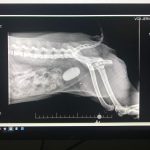Hello,
My guess is that the tail should be amputated to the point where there is viable skin to close the incision. I am worried that the hair will not grow back and she will be in constant discomfort to the point of self traumatizing. I don’t have any cheaper options for you. I’m sorry. I suppose there is a chance the tail might heal but any and all open wounds should be carefully monitored for infection and maggots. Please see a vet. At least for an exam and ask for guidance.
I rescue kittens and find them forever homes. I currently have 5 kittens. Took them for initial check up Friday. All have upper respiratory infections. I was given Clavamox and terramycin eye ointment. One has developed severe conjunctivitis despite above treatment. Went back to vets and was told to continue above meds. The last kitten I had with this required an antibiotic injection. This kittens eyes have gotten worse since Friday not better. I am frustrated and this kitten is miserable.
Comments
Our outdoor cat (1yr) wasn’t around during the day, like she usually is, for lots of love. When she finally came around that night, we noticed the top of her tail seemed skinned on the bottom part (just meaty flesh), about 2.5inches. We went to our local farm store and bought a spray to keep infection out and help heal. She seemed to feel better a couple days later, eating and coming around more. Then we noticed the whole tail was looking abnormal, like skinned, with fur hanging. She became more herself, following us around property, wanting alot of love, moving easily, jumping up on things, eating well. 2.5 weeks since this first began, and today, the whole outer part came off! It was almost like a cacoon type looking, hollow inside! All the hair and everything is now gone, just about 4-5″ of completely bare flesh.
I have documented with video/pictures the whole time. We weren’t sure if an animal tried to bite her, or she had gotten it caught in a trap? We love her so much, my 5yr old has raised her after her mommy died 6wks after birth. We are a one income family, and my husband is about to have surgery that we have to pay for upfront, as well as coming up with the money the short term disability won’t pay for 6wks…we are at a loss?
First pic is how it has looked for about 2 weeks, then the other 3 pics are from today ?)
Comments
So we stumbled upon a 2 yr old puggle who was going to be surrender to the Humane Society. We were told that she is being treated for a UTI but was very healthy. The owners were keeping her in a cage for 12-15 hrs which would definitely cause the UTI. So we asked around and found a family member in NY that was willing to take her. Long story short, we took her to NY and got her a check up. She doesn’t only have a UTI but also a huge stone in her bladder which needs to be removed surgically. My mother in law cannot afford this surgery being on a fixed income. Being the owner of 5 of my own pets, I cannot afford it either. But we don’t want this sweet dog going back to the owner or shelter. Can you recommend somewhere that would consider doing pro-bono or discounted work for rescue pets? We plan on bringing her back to Maryland tonight.
Comments
I have a 3 and a half year old GSD with HYPOthyroidism. I’m curious if anyone else has dealt with this disease in itself. So to begin, when she was about a year old I started noticing redness on her stomach. The vet I was currently with kept telling me she had ringworm and providing me with medicated shampoo and treating her with ketoconazole. It always seemed to clear up but would come right back soon after. So I searched and found another vet and he did all the testing and blood work and diagnosed her with HYPOthyroidism. She has kept a chronic skin infection which he diagnosed as a type of yeast infection due to the fluctuation of thyroid levels. She has been on levothyroxine for a year now. We have adjusted her dosage 3 times and each time she seems to do well for a month or so and then it seems to “level out” and her skin flare up comes back full force. It seems to get better and lightens up and starts to pink up and then goes right back to the hair loss and crusty on her stomach and under her legs/pits. I continue to do the medicated baths as told but it’s getting frustrating. I’m in the vet’s office every couple months it seems and spending hundreds each visit for the same thing with no resolve. Dont get me wrong I will do whatever it takes to help her but somethings gotta give. I’m just curious if anyone else has seen/heard or has dealt with hypothyroidism and the chronic skin infection. Have u found anything that helps or resolves it? What is your experience? Also she keeps bad ear infections (also tested and diagnosed as a type of yeast) daily flushes and drops in her ears as well. Still not seeming to get any better.
I feel so helpless and quite frankly I’m getting discouraged. I love the vet she sees now, he is a million times better than the one she seen previously.
Does it ever get better?
The pic is an older one, shes alot better now but still has the hairloss and discoloration over the better part of her stomach and under her legs. Just not as dark or as much.
Comments
-
Elizabeth Crisp Her vet seems to think it is unlikely due to the fluctuation in thyroid levels. Heck I dont know anymore. It may be time to find another vet?
-
Elizabeth Crisp Ha ha it’s not a problem. Thank you for the response! I talked to a different vet awaaaaaaaay the same office and he suggested ruling out a food allergy, then told me about a Veterinary dermatologist nearby. So we will start next week and see what we find out!
My 1 year old neutered male cat has been singing the song of his people nightly, starting around 0200. It’s actually more a chirp than a meow, but he doesn’t stop until the sun comes up. He isn’t locked out of the bedroom, food and water needs are met, litter is clean, etc. He doesn’t do this during the day. He seems to keep these shenanigans confined to the hallway or the bedroom. He just walks around chirping with the occasional half meow.
The only thing that seems to stop him is if I kick his brother (littermate and best friend) out of my bed and lock them both out of the bedroom, which makes HIM sad. Choir boy is happy to sleep in our bed any other time of day, with or without human or feline companions, so it’s not like he wants his brother out of the room because he himself is uncomfortable in there.
I should add that there have not been any food, litter, family dynamic, or even furniture changes. Nothing new in his world. What gives?!
Comments
IVDD – Beagle.
Hi, I reached out a few weeks ago because my dog was diagnosed with IVDD but could not use the bathroom on his own and it was next to impossible to express him. After a couple of weeks of manually catheterizing him, he started to use the bathroom on his own regularly. He also started to regain a lot of strength back, especially in his back legs. The problem area is in his neck but he is able to wag his tail and turn his neck all around. He still cannot walk, he can hold his backend up but his front two paws continue to knuckle and go under him when he tries to walk. I watched the videos on Hank and I know he had a similar issue but you did not go into depth as one video his front paws didn’t work and then the next video all of a sudden he was walking. Is there anything I can do to speed up this process or help him? I’m so proud of how hard he’s come and I don’t want to give up now.
Comments
My male cat has trouble passing urine today, went to the vet and was diagnosed with idiopathic cystitis. He’s not completely blocked only passing tiny dribbles of urine. Was prescribed an anti inflammatory, pain meds and new wet food. He’s been drinking lots of water and not eating since we got back from the vet. I’m worried about him. Was told to wait and see and then come back if no change or symptoms worsen. He’s been hiding under the bed no improvement. Won’t eat. We have some calming spray and topical drops coming in the mail soon just to see if that helps with any stress. Would love to hear anything you can contribute.
Comments
My sister has several female barn cats who have had multiple litters of kittens. I am willing to pay to have them spayed and vaccinated. Low cost spay/neuter places have a 6-8 week waiting list. I am willing to pay full price for the spay. I am looking for a clinic where I can bring them one at a time. Have them vaccinated and spayed. My vet is requiring a preop visit and then I would have to schedule spay. This would basically be impossible for me to do. Why can’t this all be done at one time? Trap/neuter/release programs do this all the time. Do you have any suggestions or know of any vet clinics that can accommodate me?
Comments
Back in December my dog Beagle/Bulldog who is very persistent started not being able to jump on our bed from the floor. I thought he was just getting old. Then he really couldn’t so we would lift him but he would jump off and he has done this his whole life. Then it got worse where his legs were giving out on him in the back. I took him to the vet who sent us to the neurologist who told us he needed an MRI and possible surgery. No x-rays or bloodwork was done. I cried and was so stressed out I wanted to move forward but it could be 8-10 thousand dollars. My husband said no we cannot afford that. So I then asked the neurologist are there other options she said steroids and gave me a bottle and sent me on my way. In three days he was like a new dog. He was walking almost perfectly, and acting normally. This went on for about 2 months. He then started to have a little trouble with the back leg. It’s impossible to keep him off the bed. He follows me everywhere. I did get stairs for the couch and bed. I called the regular vet and she gave me another RX for the steroid after I told her it worked so well. She said she cannot give him anymore he would need the surgery. He just had another episode of the leg going out and this time it seems to effect his front leg. I gave him 3 steroid pills I had left and he is a million times better. I also put a gait in front of the stairs but he still goes on the couch. I want him to have a great quality of life. He seems ok other than the leg going out. We feel it’s almost like my back. I have a herniated disc and here and there it will go out. How do they make a proper diagnosis without doing a 2300 MRI? Please help with any advice. Is this IVDD
Comments
My one and a half year old cat seems to have a sore at the corner of her mouth. It might just be a small scab, she is eating normally/drinking water and going in the liter box like normal. I’m not sure if we should take her to the vet if it could be something really bad or if it’s nothing. Please let me know, thank you
















I would call and speak to the vet. Let them know if your previous experience and that this kitten is having similar issues. I would ask for the stronger treatment and explain why you’re so concerned. Best of luck!